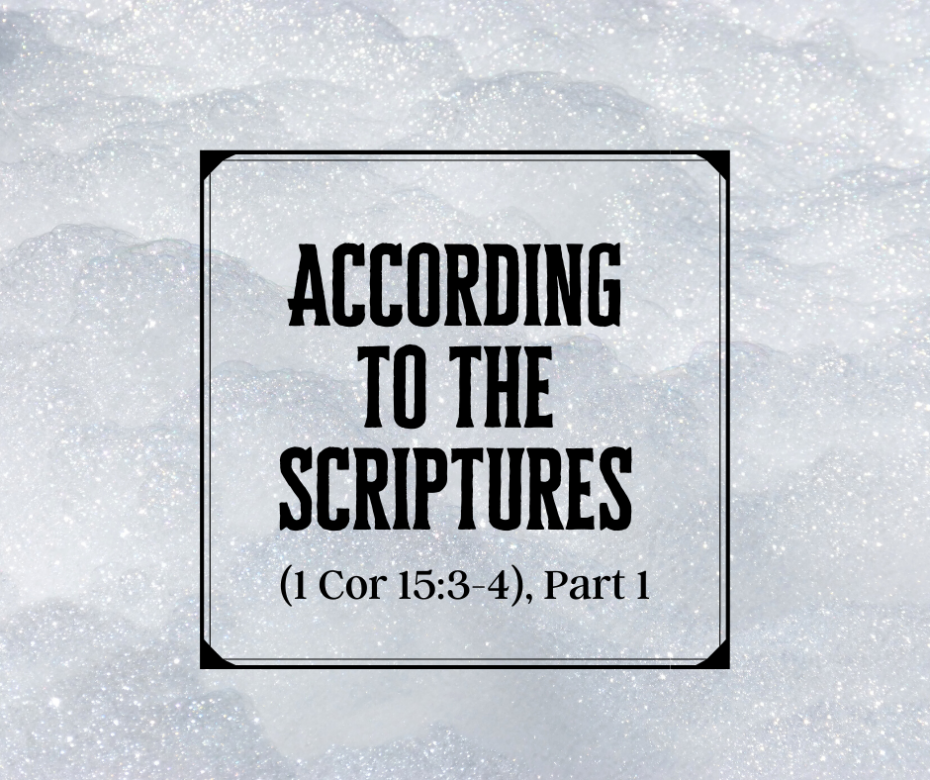For I delivered to you first of all that which I also received: that Christ died for our sins according to the Scriptures, and that He was buried, and that He rose again the third day according to the Scriptures (1 Cor 15:3-4).
Have you ever wondered what Scriptures Paul was referring to? Some have suggested that Paul must have been referring to NT books that had already been written, such as the Gospels. I don’t think that’s the answer, because in Luke 24, the risen Jesus taught the disciples the same truths:
Then He said to them, “Thus it is written, and thus it was necessary for the Christ to suffer and to rise from the dead the third day” (Luke 24:46).
Jesus obviously wasn’t referring to the NT Scriptures, since those had not been written yet. However, we’re not told which Scriptures He referred them to!
So that’s my question—which passages teach or prophesy that (1) the Messiah would die for our sins, (2) He would be buried, and (3) He would rise again the third day?
Notice Paul said Scriptures, plural. He has more than one in mind. And in the manner of Biblical prophecy, it is not always crystal-clear which ones are meant. You have to put the puzzle pieces together.
First, what Scriptures show that Messiah would die for sins? The key passage is Isaiah 53:
Surely our griefs He Himself bore,
And our sorrows He carried;
Yet we ourselves esteemed Him stricken,
Smitten of God, and afflicted.
But He was pierced through for our transgressions,
He was crushed for our iniquities;
The chastening for our well-being fell upon Him,
And by His scourging we are healed.
All of us like sheep have gone astray,
Each of us has turned to his own way;
But the Lord has caused the iniquity of us all
To fall on Him (Isa 53:4-6 NASB).
So Messiah is depicted as suffering for sin. He is pierced for transgressions and our iniquity falls on Him.
But does He also die? Yes:
Like a lamb that is led to slaughter,
And like a sheep that is silent before its shearers,
So He did not open His mouth…
That He was cut off out of the land of the living;
For the transgression of my people, to whom the stroke was due? (Isa 53:7b, 8b)
Messiah is killed like a lamb led to slaughter (cf. John 1:29) and “cut off” from the land of the living. In short, Messiah dies (cf. Gen 3:15). As Isaiah concludes chapter 53, Messiah would die after bearing our sin:
Because He poured out Himself to death,
And was numbered with the transgressors;
Yet He Himself bore the sin of many,
And interceded for the transgressors (Isa 53:12b).
Second, what Scriptures show that Messiah would be buried? Once again, the answer is in Isaiah 53. After describing Messiah as being cut off from the land of the living, Isaiah says:
His grave was assigned with wicked men,
Yet He was with a rich man in His death,
Because He had done no violence,
Nor was there any deceit in His mouth (Isa 53:9).
You will remember that Joseph of Arimathea put Jesus’ corpse into his rock-hewn tomb.
Third, what Scriptures say Messiah would be raised again? Let’s start with Psalm 16:
For You will not leave my soul in Sheol,
Nor will You allow Your Holy One to see corruption (Psalm 16:10; cf. Acts 2:24-28; 13:33-35).
If God won’t leave Messiah in the grave to see corruption, what must happen? He must be raised from the dead! Messiah will be killed and then will live again—as Job saw:
For I know that my Redeemer lives, And He shall stand at last on the earth; And after my skin is destroyed, this I know, That in my flesh I shall see God, Whom I shall see for myself, And my eyes shall behold, and not another (Job 19:25-27).
So, Messiah would not stay dead. He would not be left in the grave. Job foresaw a time when he would see his Redeemer—alive and standing on the earth. Hence, Messiah would be raised from the dead.
Fourth, which Scriptures say that Messiah would be raised on the third day? Frankly, the NT does not quote any specific OT text that prophesies about the Messiah rising the third day. So what is Paul referring to? We’ll have to explore that in more depth in Part 2.


